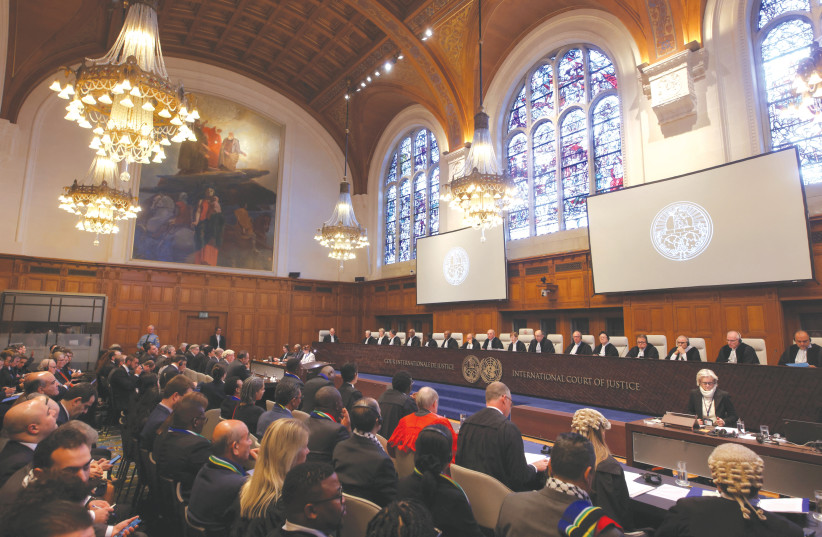The International Court of Justice in The Hague (ICJ) rejected South Africa’s Provisional Measures rule aimed at stopping the fighting, under the banner of a “humanitarian ceasefire” on behalf of the Hamas terrorist organization. Ostensibly, the orders issued against Israel are only declarative and obligate Israel to act in accordance with international law, which is the case since the beginning of the fighting. Still, the very existence of the discussion, the provisional measures that were established and the media coverage surrounding it tarnish Israel’s name and even damage its image on the international level.
Israel was relieved that the ICJ did not rule in the context of the provisional measures debate on stopping the fighting in Gaza under a temporary humanitarian ceasefire and were quick to think that these steps clearly express Israel’s right to defend itself, or in other words, the ICJ legitimized the continuation of the fighting by not temporarily ruling on its halt. But on the other hand, news agencies around the world rushed to cover the court hearing and its decisions in the opposite way, under the headline “Israeli defeat.”
The rhetoric of the ICJ in general, and the rhetoric of the ICJ president in particular, American Judge Joan Donoghue, was clear despite the lack of a decision to stop the fighting in Gaza, citing Defense Minister Yoav Gallant and other Israeli politicians after the October 7 massacre. When the president’s Court stated during the hearing that “South Africa’s right to demand certain orders against Israel is justified,” it damages Israel’s image and gives a platform to the grave and legally baseless accusations against the State of Israel and the Jewish people, which itself committed true genocide, despite evidence presented to the honorable court.
In fact, the ICJ understood that South Africa’s claim against Israel for “genocide” lacked a strong and verifiable legal basis, or in other words, the legal case is very weak, as can be seen within the Court’s Provisional Measures. Still, the ICJ chose to emphasize the importance of South Africa in seeking temporary injunctions and even ruled that Israel must take every possible step to prevent a violation of the Genocide Convention, to which it is a signatory, while maintaining normal life in the Gaza Strip.
While the ICJ forgot that international law does recognize wars between states and even takes into account the harm caused to “innocent civilians,” it also forgot that Israel is dealing with a cruel terrorist organization that uses its civilians as human shields, and most critically, that Israel, despite all these challenges, has been committed to and implements international law on the ground since the beginning of the fighting.

What the ICJ should have done
INSTEAD OF giving a platform to South Africa’s detached accusations, the ICJ could have called for a broader effort by the Red Cross to reach the Israeli hostages in Gaza, and could have emphasized stronger, the demand for the return of all hostages safe and sound, thereby effectively calling for an end to the fighting suffered by many Palestinians. Most importantly, the ICJ could recognize that Israel operates in accordance with international law on the ground, but it chose not to do so.
The ICJ’s choice of words damages Israel’s image as the only democracy in the region surrounded by enemies identified as terrorist organizations, which even international law does not yet contain. In providing provisional measures, the ICJ reaffirms to some extent South Africa’s delusional accusations of fighting, while Israel does everything in its power to prevent harm to innocent Palestinians.
The ICJ’s provisional measures pave the way for Israel to be accused of genocide. When the ICJ orders closer supervision of Israel in the context of the fighting, leaving open questions on the Israeli side, such as whether Israel will cooperate with the court’s close supervision or whether it will not grant it the legitimacy to intervene in its internal affairs, thus leaving Israel under a spotlight that does it no favors. The temporary decisions of the Court show that there is indeed a real likelihood, that ostensibly does not exist now, because Israel will indeed commit “genocide” and, as a result, it must be monitored.
The serious accusations and rhetoric of the ICJ do not, and rightly so, affect Israel’s right to defend itself and its citizens, but they do give Israel a label that it has worked hard not to accept. On the other hand, the South Africans, on behalf of the terrorist organization, succeeded in shaping the narrative against Israel even though they knew that Israel was not actually committing genocide in Gaza, thus garnering great sympathy. Israel must work smarter and fight for its image on the international level, no less than its war on the ground. Israel and its decision makers must understand that international legitimacy, or in other words, Israel’s “public relations” is a necessary condition for the current campaign and always has been, but now more than ever.
The writer has extensive experience in the marketing and public relations industry, and hosts a podcast on government issues. Currently, in his third and final year of his BA in Government, Diplomacy, and Strategy at Reichman University, he is a fellow of the Argov Program in Leadership and Diplomacy.
